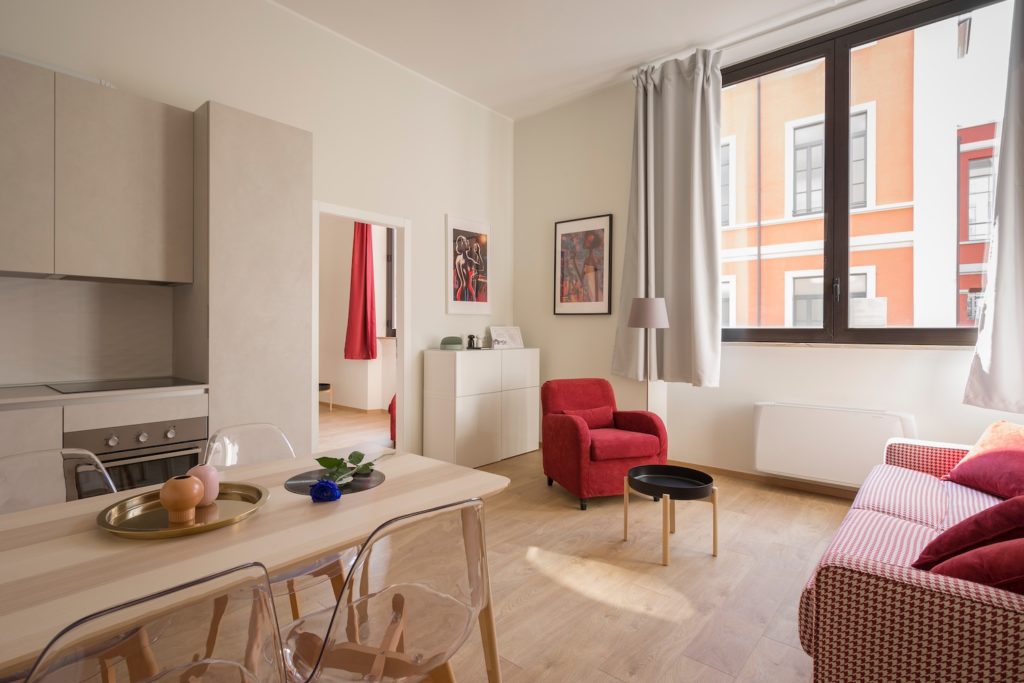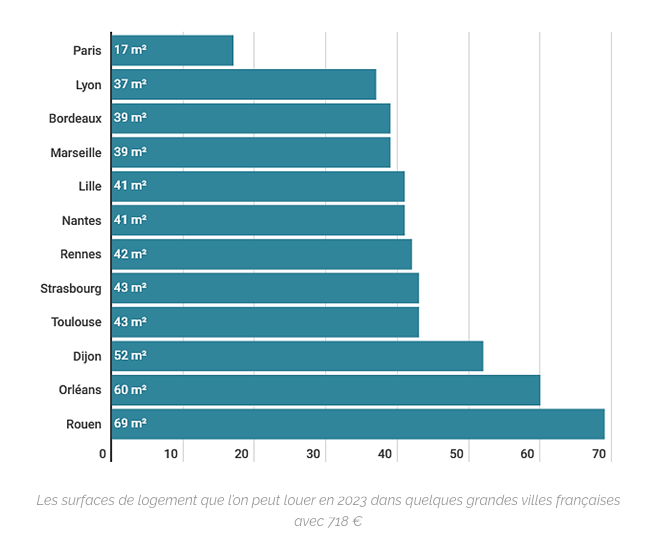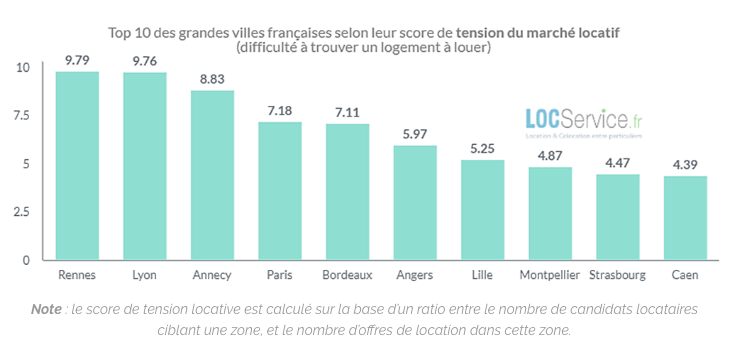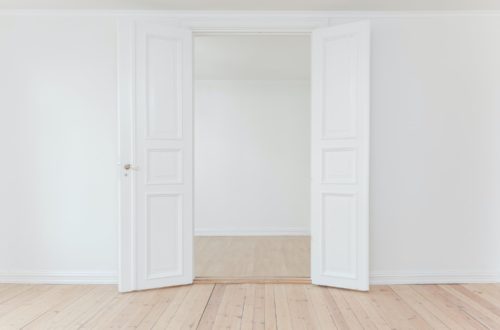Looking for a long-term rental in France is not an easy task, especially when you come from another country. To help in your research here are some insider tips for you!
If you’ve searched for housing before, you know that finding the accommodation of your dreams doesn’t happen overnight. Between reviewing multiple websites, lowering your standards or visiting different types of housing, it’s difficult to find the perfect place!
It takes most people about two to three weeks to find a rental apartment. You can reduce your home search time by asking yourself the right questions:
Furnished or unfurnished? Shared flat or own apartment? My budget is charges included or rent only? Take the time to prepare your home finding, and get organised. That way you will get an idea of your needs to find your ideal home. It will be worth it. It is your future home after all!

Table of Contents
Tip 1: Set your budget and needs
Your housing budget according to rental agencies
Rental prices vary a lot depending on where you are looking for accommodation. Real estate agencies usually have an unwritten rule, that the rent shouldn’t exceed 1/3 of the tenant’s income. So if you search via an agency, this pretty much sets your budget and the type of accommodation you can afford in a given location.
This unwritten rule surprises many expats. It is common to spend a higher portion of the income on accommodation in other countries. However, the tenants are highly protected by French real estate law, which makes it very hard for a landlord to evict a tenant who’s not paying the rent. Agencies and landlords want to make sure the tenant will be able to pay the rent.
According to LocService, with a €718 monthly budget, this is the property size you could get in the main French cities in January 2023 as an estimated average:

Rental prices will also differ if you are renting furnished or unfurnished. Furnished accommodation is usually 20% more expensive.
The hidden costs
In addition to the actual rent, you also have to consider the following hidden costs:
- Moving costs.
- Real estate agency fees: usually around one month’s rent.
- Security deposit: One month’s rent, excluding charges (can be more for furnished accommodation).
- Fees to turn on the utilities:
- Water (between €30 and €60 depending on the region and provider)
- Gas and electricity (between €20 if you plan it – 5 days – and up to 150€ for an express service – 24h)
- Internet: about 50€
- Rental insurance (compulsory in France): the annual fee can go from €160 to €500 depending on the region and type of property.
- Housing tax: anyone occupying a property on 1st January must pay a housing tax (taxe d’habitation). The amount depends on the accommodation type, its location and your income and situation. It can go from about €100 to about one month’s rent.
This tax must be paid, even if you have moved during the year, within France or abroad. You will be sent a tax notice in September by post to your residence or to the address that you provided to the tax administration.
Tip 2: Understand the ads
Coded terms
Understanding the renting ads, besides the normal vocabulary, can be difficult as real estate agents often use coded terms and abbreviations.
You may have seen the codes T1, T2, F1, F2…on rental ads. French rentals are classified by size and coded as follows: T (type) is for the apartment and F (foncier) is for houses. The number illustrates the living space plus the number of bedrooms.
The kitchen, bathroom and toilet are not mentioned. The toilet is often separate from the bathroom, an important feature for many French people.
You can sometimes see an ad for a T2 Bis. The Bis will stand for a double room. This means there would be an alcove in the bedroom or the living room. Alcoves are very common in Lyon’s old apartments, for example.
For instance, a T2 is a one-bedroom apartment:
- T: apartment
- 2: 2 rooms (one living room and one bedroom)
F3 is a house with 2 bedrooms.
- F: house
- 3 : 3 rooms (one living room and two bedrooms)
CAUTION: there is often a misuse of the F category. You will find many one-bedroom apartments stated as F2 instead of T2.
Abbreviations
Abbreviations are very common in rental ads, and there are hundreds of them. I have listed some here:
- Asc: Ascenseur (lift)
- Chb: Chambre (bedroom)
- CC: Charges comprises (monthly housing fees included)
- Chauff: Chauffage (heating)
- Sbd: Salle de bain (bathroom). Salle d’eau means there is no bathtub and only a shower
- RDC: Rez de Chaussée (ground floor)
Tip 3: Prepare your rental file
Whether you are home-hunting using an agency or not, you will have to prepare a rental file to apply for the properties you are interested in. It is strongly advised to prepare it in advance and have it with you when you first visit the flat, especially in big cities where the competition can be fierce, as shown below according to LocService numbers.
Top 10 Number of housing requests per rental offer in 2023

The following documentation (known as a dossier) can be requested from prospective tenants:
- Proof of identity
- Proof of earnings and employment status (work contract, tax filings from the year before, last three payslips)
- Proof of sufficient resources
- Proof of current address
- Copy of your RIB (bank account details – some landlords may ask for a larger deposit if you do not yet have a French bank account)
Once you have completed those steps, you are finally ready to visit as many places as possible, until you find your new home.
Tip 4: How to find your long-term rental in France?
Book a temporary housing
There is no miracle recipe, unfortunately. Every possible option should be used at the same time to stack all the odds in your favour.
Many expats find it difficult to secure a place before arriving in France. It is also more secure to visit a place before committing to renting. It is quite common to rent an Airbnb or hotel for a few weeks, the time to find a place to live.
As mentioned above, the average time to find a long-term rental in France is about two to three weeks. So you can book short-term accommodation for this duration with an option to extend just in case.
The most popular ways to find a long-term rental in France
To avoid any scams, I strongly recommend you pay any deposit and sign a rental contract only after visiting the property once you arrive in France.
- Online (specialised websites, Facebook, forums)
- Through an agency: (see below) While a more expensive option than looking on your own, an agent can help you find a place to live more quickly.
- Bulletin boards: (Les petites annonces) If you are coming to France to study, check to see if the university or educational institution has a bulletin board where people may post places for rent.
- Keep your eyes and ears open: Networking is usually the way to find the best deals! So talk about your research to your new colleagues, and your acquaintances… they might have heard of good opportunities!
Useful websites
- LeBonCoin: the French version of the British Gumtree or the American Craigslist. You can find almost everything here, and also apartments! However, be careful with the ads that appear “too good to be true” – they probably are!
- Se Loger: one of the major online real estate portals that lists both rentals and properties for sale. Many ads are posted by agencies.
- De Particulier à Particulier (PAP): an online real estate portal that lists rentals/properties for sale by “private landlords” – meaning there are no agency fees. You may need to pay to access contact information for certain listings. This website is used a lot in Paris, but less in other cities.
- FUSAC: An English-language online community magazine with a Paris focus. There is a housing section and you do not have to be a member to access contact information.
Tip 5: How to find a long-term rental in France without a guarantor?
Why a guarantor is needed?
The guarantor (garant) is someone who will agree to pay the rent on your behalf should you ever miss paying one month.
Guarantors are extra security for the owners as the French real estate law protects greatly the tenants. Therefore, agencies and owners want to make sure the rent will be paid if the tenant is momentarily unable to do so.
The guarantor is usually required to provide proof of their employment/resources, along with a letter confirming their agreement to guarantee the rent for the landlord. Most agencies prefer a guarantor living in France, though some may accept one living abroad, mainly within the EU.
Not having a guarantor in France is often the biggest challenge for an expat.
Ask around you
If you don’t know anyone who could be your guarantor, you may want to consider asking your employer.
Companies can not be guarantors as entities, but your boss may accept to be, as the more time you spend looking for a property, the harder it will be to focus on your job.
Convince the landlord to take ”unpaid rent insurance”
This is specific insurance for landlords that will cover unpaid rent. It is forbidden for landlords to request a guarantor when they contract this type of insurance. The main argument is that it can also be complicated to receive the payment from a guarantor and this specific insurance is more reliable for everyone.
Get a guarantor via the VISAL system
The VISAL system only applies to tenants under specific conditions:
- Anyone under the age of 31
- Professional with a work contract above the age of 31
- The application must be made within the first 6 months of your new work contract.
- Guaranty applicable for the mobility rental contracts (bail mobilité) only. They are specific rental contracts for furnished rentals under a 10-month duration.
I hope these insider tips helped you to prepare for your house hunting and be as ready as possible for an efficient home search! Good luck! Let me know how it went in the below comments.
If you have found these tips useful, please share this article with your fellow expat friends!
Long-term rental in France FAQ
How do I find a long-term rental in France?
The two biggest websites in France to find a long-term rental are leboncoin.fr and seloger.com.
You can also find good deals by scanning the area of your choice to find rental boards with the “A Louer sign”. Local shops and the local newspaper can also have interesting ads.
Can I rent in France without a guarantor
Yes, it is legally possible to rent a property without a guarantor, but it is difficult since the majority of the agencies will ask for one.
Some owners will accept to rent without a guarantor. There are also some ways to find a guarantor locally or ways to avoid this request. The VISALE system is a good option but also targets properties covered by “unpaid rent insurance”.
What is VISALE?
VISALE is a free service providing a guarantor for people under the age of 31 or professionals renting a property within the first six months of their new work contract. The guarantee applies only to tenants with a mobility rental lease (bail mobilité). The guarantee can be requested online directly.
What are the documents requested for the rental application file in France?
The following proofs are requested in France: proof of ID, proof of earnings or sufficient resources, proof of employment (if applicable), proof of current address, and your bank details. Other documents can also be requested but some documents are illegal to request in France such as a criminal record or medical information.


